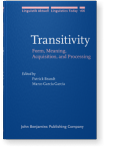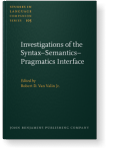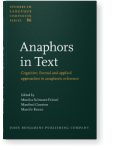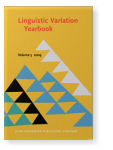Matthias Schlesewsky
List of John Benjamins publications for which Matthias Schlesewsky plays a role.
2010 Grammatical transitivity vs. interpretive distinctness: The case for a separation of two levels of representation that are often conflated Transitivity: Form, Meaning, Acquisition, and Processing, Brandt, Patrick and Marco García García (eds.), pp. 161–188 | Article
This chapter examines the role of transitivity in online language comprehension by means of an event-related brain potential (ERP) study on differential object marking in Hindi. Participants read sentences of the form NP1-NP2-Verb; NP1 always bore ergative case, whereas NP2 was either case-marked… read more
2008 Unmarked transitivity: A processing constraint on linking Investigations of the Syntax–Semantics–Pragmatics Interface, Van Valin Jr., Robert D. (ed.), pp. 413–434 | Article
Recent experimental evidence suggests that a prototypical concept of transitive events (“unmarked transitivity”), which has proven a useful descriptive notion in language typological research, also plays a crucial role during real time language comprehension. In this chapter, we review… read more
2007 Resolving complex anaphors: Evidence from online comprehension Anaphors in Text: Cognitive, formal and applied approaches to anaphoric reference, Schwarz-Friesel, Monika, Manfred Consten and Mareile Knees (eds.), pp. 259–278 | Article
This study investigates the question of whether the processing of complex anaphors require more cognitive effort than the processing of NP-anaphors. Complex anaphors refer to abstract objects which are not introduced as a noun phrase and bring about the creation of a new discourse referent. This… read more
2005 Syntactic variation in German wh-questions: Empirical investigations of weak crossover violations and long wh-movement Linguistic Variation Yearbook 2005, Pica, Pierre, Johan Rooryck and Jeroen van Craenenbroeck (eds.), pp. 37–63 | Article
This paper reports three experiments concerning variation in the grammar of German wh-questions. We found much variation but no clear dialects in the acceptability ratings of sentences violating the weak crossover condition. We attribute this variation to extra-grammatical factors. With a sentence… read more



